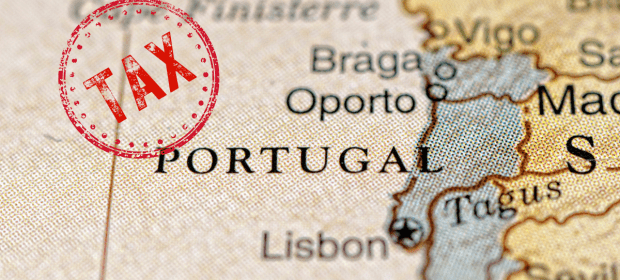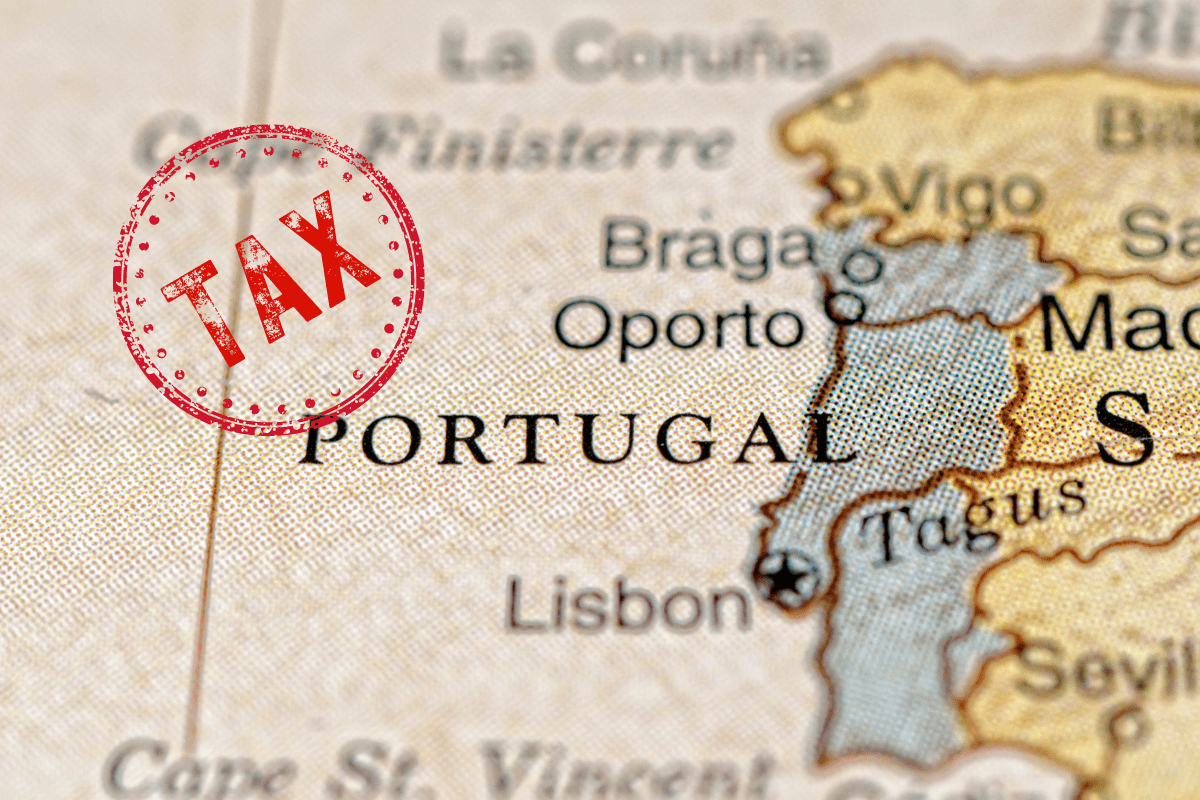Tax in Portugal – Webinar
By Mark Quinn
This article is published on: 13th January 2023

International tax issues affecting
Please join us for our quarterly client update and 2023 outlook video call on Thursday 26th January at 11am.
After registering, you will receive a confirmation email
containing information about joining the webinar.
I will be updating you on international tax issues affecting residents in Portugal, and those looking to relocate here.
I will also be joined by two specialists to give their thoughts on investment and currency markets:
Christopher Saunders
New Horizon Co-founder and Chartered Wealth Manager
Chris co-founded New Horizon in 2008 and has focussed on developing services to IFAs, accountants and other intermediaries and works with many leading IFA groups and accountancy networks in the UK and overseas.
Steve Eakins
Currency specialist, Lumon
Steve has been working in the international payments market for nearly 15 years. Over that time he has helped clients through the market around ash clouds, hung governments, wars in Europe, Brexit and Trump.

Planning for Non-Habitual Residency in Portugal
By Mark Quinn
This article is published on: 16th December 2022

Portugal has long since been a popular expat destination, but the Non-Habitual Residence (NHR) scheme has been instrumental in attracting new residents seeking a favourable tax regime.
NHR is a preferential tax status granted to new residents and lasts 10 years. However, the benefits of NHR are not automatic and you must plan to make the scheme work for your specific situation.
Pre-arrival planning
The ideal situation is to start looking at your finances before you move. This way you can identify any tax planning opportunities available in your home country that would otherwise not be available in Portugal and utilise any tax breaks and annual allowances.
From a UK context, for example, ISAs are tax-free in the UK but if you wait to surrender until after establishing residency in Portugal you will incur 28% tax on any gain (even with NHR).
NHR period planning
During NHR it is important to maximise the tax opportunities available, particularly the flat 10% rate on pension income and nil rate tax on foreign-sourced capital gains and income. It is also the opportune time to start thinking about how to structure your finances for when NHR comes to an end.

Post-NHR planning
At this point, you become subject to the standard rates of Portugal tax and the effectiveness of your position will be determined by the planning you previous implemented, particularly during the NHR stage.
Whilst the prospect of paying up to 48% on income (excluding solidarity taxes) and 28% on all capital gains is unpleasant, it is possible to rearrange your finances over time to reduce this tax burden.
Lastly, there are some subtle rules to the NHR scheme and international tax meaning that in some cases applying for NHR can put you in a worse tax position. Likewise, those with pre-April 2020 NHR and enjoying 0% tax on pension income will be subject to slightly different restrictions when drawing down their pensions to maintain this status.
As such, we recommend you always seek advice from appropriately qualified individuals with effective cross-border experience.
With over 30 years of combined experience in the industry and over 15 in Portugal, we are best placed to provide expert, impartial and personalised advice to expatriates. Please contact us if you wish to discuss your position.
Tax and property in Portugal
By Mark Quinn
This article is published on: 14th December 2022

I’m often asked for my opinion on property as an investment, either in Portugal or elsewhere and I must admit it doesn’t tick many boxes as an investment.
For example, it is generally subject to income tax, capital gains tax and succession tax, as well as ongoing local rates. It cannot be converted into cash quickly or easily (illiquid) and it is expensive and time-consuming to maintain. It also comes with administrative issues such as unruly tenants, rental void periods and due to its static nature, it is difficult to plan around.
Having said this, property continues to be a popular investment choice as it is easy to understand and you can touch it, giving investors a sense of security and reduced risk. Additionally, we probably all know a few ‘property millionaires’. So, what are the planning angles and how can you ‘get out’ and enjoy your spoils tax efficiently?
Capital gains tax (CGT)
Portuguese residents are subject to capital gains tax (CGT) on their worldwide property gains, unless the property was purchased before 1st January 1989, in which case CGT does not apply.
For Non-Habitual Residents (NHR) selling Portuguese property and non-NHRs CGT is due on 50% of the gain and is added to your other income in that tax year and taxed at scale rates.
In addition to this, if the property is located overseas, tax may also be due in the country the property is located. However, if there is a double taxation agreement between the two countries e.g. Portugal and the UK, you should not pay tax twice on the same gain.
Portuguese property
NHR status does not have an impact on the taxation of Portuguese property. The tax treatment is the same for NHR and normal residents, but despite the potential for eye-watering levels of tax, there are some reliefs available if the property you are selling is your home – it does not apply to rental property sold in Portugal. The two reliefs mentioned can be used in isolation or conjunction.

Main residence relief: You can mitigate all – or a portion of – the CGT by reinvesting the proceeds into another property in the EU or EEA. Any amount not reinvested is taxed.
Reinvestment into a qualifying pension or long-term savings structure: This is a relatively recent relief and is particularly advantageous for those wishing to downsize (and therefore will not fully reinvest the sale proceeds), or for those moving back to the UK or elsewhere outside of the EU/EEA.
There are strict criteria for qualification and we can advise on this area but most notably, you or your spouse must be retired or above 65 and the gain must be reinvested in a qualifying structure.
Non-Habitual Residence (NHR)
NHR gives those selling foreign property an advantage as gains are exempt from CGT in Portugal.
But what about the tax due in the country the property is located? Let’s look at UK property as an example.
The UK only applies CGT to gains accumulated since 6th April 2015 and you will also have your annual CGT allowance to deduct of £12,300 per person. Additional reliefs may also apply, further reducing any gains, but this will depend on whether the property sold was your home or investment property.
For example, if you bought an investment property in joint names in 1992 for £100,000 and it was sold today at £1m, ordinarily tax would be due on the £900k gain. But selling this as a non-UK resident, you only pay tax on the gain since April 2015 Using the straight-line method, the gain is £212,000 from which you can deduct your annual CGT allowance, leaving a taxable gain of £199,700. Assuming you had no UK income in that tax year, the tax due to HMRC would be £52,146 which is an effective rate of 5.7%.
Debrah Broadfield and Mark Quinn are Chartered Financial Planners (level 6) and Tax Advisers specialising in cross-border advice for expatriates.
Contact us at: +351 289 355 316
mark.quinn@spectrum-ifa.com
debrah.broadfield@spectrum-ifa.com
Don’t get caught paying 53% capital gains tax in 2023
By Mark Quinn
This article is published on: 12th December 2022

The saying goes that there are only two certainties in life: death and taxes. One you cannot control but the other you can through advice and careful planning.
Short-term CGT: approved for 2023
From 1st January 2023 any gain arising from the disposal or transfer of shares/securities held for less than 365 days will be taxed at progressive rates of income tax i.e. 48% plus 2.5%/5% solidarity tax, if your total taxable income (including the gain) is more than €75,009.
Shares/securities held for more than 365 days, or where your total taxable income including the gain is below €75,009, will remain taxable at 28%.
This is important if you or your investment adviser is trading, rebalancing or switching regularly.
Changes to taxation of crypto: budget proposal
Portugal has been touted as a crypto investor’s dream with 0% tax on gains. Although not yet agreed, investors should be aware of the potential changes to the taxation of crypto assets which if agreed, will come into effect in 2023.
Firstly, NFTs could be deemed crypto assets under the new definition. Secondly, it is not just simply selling crypto/NFTs that will trigger a charge – other triggers include purchasing goods and services with crypto or trading for a different type of crypto.
Gains arising on the disposal of crypto will be taxed if held for less than 365 days at 28%. This will apply even if the crypto was purchased before the rules (potentially) come into force on 1st January 2023.
Issuing, mining or validating crypto transactions would be deemed a business activity and taxed as such i.e. 15% of the income taxable at progressive rates without deductions for expenses (if the business did not generate more than €200,000 gross in the previous year). If the business generated more than €200,000 in the previous year, net income is taxable at progressive tax rates (48% plus 2.5%/5% solidarity tax). If trading via a company, 21% plus surtaxes may apply.

Solution: wrap it up!
Investing within a tax-favoured structure could shield you from short-term CGT. This means that your investment decisions will not be constrained by the tax implications, and you can benefit from compounding/tax-free roll-up of income and gains.
Become your own tax planner
For those relocating to Portugal, it is an opportune time to tax plan. There is no ‘step-up’ in Portugal, and gains are taxable from the date of the original purchase. You can create your own step-up by rebasing your assets before you leave your home country i.e. sell and repurchase your funds/shares. This will also allow you to utilise any CGT reliefs/allowances that would otherwise not be available in Portugal or be taxed at a much lower rate than 28% depending on your originating country’s CGT tax rules.
Contact us for a free impartial discussion if you would like to understand more.
With over 30 years of combined experience in the industry and over 15 in Portugal, Debrah Broadfield and Mark Quinn are Chartered Financial Planners (level 6) and Tax Advisers specialising in cross-border advice for expatriates.
Contact us at: +351 289 355 316
mark.quinn@spectrum-ifa.com
debrah.broadfield@spectrum-ifa.com
Financial myth busting for expats in Portugal
By Mark Quinn
This article is published on: 7th December 2022

In my conversations with clients, I come across several issues that create confusion. In this article we will dispel some key common myths.
Myth 1 – “I’ve left the UK so I won’t pay UK taxes”
The UK has a particularly complicated and adhesive tax system that clings on to former residents after they have left if they have not effectively severed their ties. So, even though you have left the UK, you could still be liable to tax in the UK on income, capital gains and on death (inheritance tax).
Additionally, certain types of income may remain taxable in the UK even after you have left and established residency elsewhere. This means that you may have to continue to complete an annual tax return for HMRC as well as make your annual declaration in Portugal.
Myth 2 – “I can come and go as I choose”
In order to maintain your residency in Portugal, or elsewhere, there are day limitations that you will have to adhere to. For example, in order to remain outside of the UK tax net after leaving, you have to cap the time you spend back in the UK. This may be as little as 16 days or as much as 182 days.
If you are in Portugal on a visa, such as the D7 or Golden Visa, you will have minimum stay requirements in Portugal to maintain this status.
Myth 3 – “I’ve left the UK, so I won’t be subject to UK Inheritance Tax (IHT)”
Unlike income tax and capital gains tax which is generally based on your location, liability to UK IHT is determined by your domicile. For most people, this means they will continue to pay UK IHT even if they no longer live in the UK.
There are steps you can take to mitigate a portion, or all, UK IHT but individual advice should be sought as it is a highly complex area. Any challenge by HMRC will be once you have passed so it requires specialist advice during your lifetime.
Myth 4 – “Non-Habitual Residence (NHR) means I’m not resident”
NHR is the 10-year tax incentivised scheme for new residents to Portugal. The name causes understandable confusion as it implies that you are not a resident of Portugal.
What NHR actually means is that you have not been tax resident in Portugal in the last 5 years, and in order to apply for NHR you must first be legally resident in Portugal.
This has created issues where people have not applied for NHR due to this misunderstanding, or worse, have been actively discouraged from applying for it even though in 99% of cases it is a financial ‘no brainer’.

Myth 5 – “NHR means I’ll pay 0%”
Whilst the NHR scheme is certainly very attractive and can result in low or nil tax rates, planning is required to achieve the best position and it does not happen automatically.
Myth 6 – “I report my income in the UK so I don’t have to declare in Portugal”
Many I speak to believe they can choose to report their income and gains in the place that results in the best financial position or where they ‘have always paid tax’, rather than where they should be paying tax.
As a resident of Portugal you should declare your worldwide income and gains, and pay the necessary tax, in Portugal.
Seek clear guidance
It is possible to achieve an extremely positive financial and tax position as a resident of Portugal, but you must ensure you have a clear understanding of the cross-border issues at play, particularly residency rules and taxation of income and gains to take full financial advantage. Speak to us for an initial consultation.
With over 30 years of combined experience in the industry and over 15 in Portugal, we are best placed to provide expert, impartial and personalised advice to expatriates. Please contact us if you wish to discuss your position.
Investment hurdles
By Mark Quinn
This article is published on: 5th December 2022

The corrosive effect of inflation and fees
Here we look at two key hurdles to investment performance, and ultimately your lifestyle, and some ways to tackle these issues.
Inflation
This is a topical issue as we all experience the pinch of rising energy, food, and other prices, with inflation in the UK and US recently hitting 7% and 8% respectively.
It is important to monitor and understand as it tells you how much return you need to maintain your current standard of living. So, what can you do to try and beat inflation?
Moving out of cash is critical as you are losing money in real terms. There is no one solution but building a diversified risk-rated portfolio gives you a greater chance of growing your money in excess of inflation over the medium to longer term.
- Shares/equities – as companies and earnings can adjust upwards, shares tend to keep up with inflation better over time than other investments. However, careful selection here is important as you want to select companies that are able to pass on cost increases to consumers
- Index-linked bonds – these are fixed-income investments and their return is linked to inflation rates
- Commodities – you can benefit from the causes of price increases by investing in companies that are involved in the production of raw materials, such as oil and metals
- Gold – can act as a hedge against inflation and also tends to act differently to the above investment types which means it provides diversification, particularly when geopolitical risks come to the fore
These investments do come with different types of risk so you should seek advice on how to minimise and balance these types of risks. It is also important to monitor and measure risks in relation to the returns you achieve.
Fees and expenses
Another factor often overlooked is fees. These may seem small but over time they can have profound long-term effects. You do not just lose the amount of the fees you pay, but you also lose all the growth that you might have received, compounded over years.
For example, assume you have a €1m portfolio paying 6% p.a. If you had no fees to pay, after 25 years, you would have. €4.3m. If you paid 2% p.a. in costs, you would have €2.6m.
Now going further, if you could reduce your overall charge from 2% to 1% p.a., you would have approx. €3.5m. This seemingly small 1% saving is really €793,215 in real terms over 25 years! And this is being paid to someone else, not you.

What can you do to control costs?
All investments have cost so you cannot avoid them, but you can manage them at all levels.
- Structure fees e.g. a pension or an investment. These are charged by the company providing the structure
- Underlying investment fund fees. These are charged by the company that manages the funds within the structure. These are paid out prior to the returns being paid to you, so you do not usually see these, so they can be easy to forget and review
- Advice fees. These are paid to your financial professional whose job is to recommend and advise you. Usually, a single set-up fee and an ongoing fee are charged. The effect of the latter is very important as this can have the most significant effect as seen in the above example
I would strongly recommend that you seek clarity on each applicable fee and benchmark these against alternative solutions to get yourself the best deal.
As with most things, as time goes on, innovation usually reduces prices. Review your structures regularly and shop around for independent advice, and lastly, remember that a higher price does not mean higher quality.
Debrah Broadfield and Mark Quinn are Chartered Financial Planners (level 6) and Tax Advisers specialising in cross-border advice for expatriates.
Contact us at: +351 289 355 316
mark.quinn@spectrum-ifa.com
debrah.broadfield@spectrum-ifa.com
A balanced portfolio
By Mark Quinn
This article is published on: 2nd December 2022

Investment and fund management
There are several different investment management styles to consider and each will have benefits and drawbacks. The key difference are between a managed/active/discretionary route, and a passive/tracker approach, and this can be a divisive area within the investment industry.
In order to put into context the differences between these styles and which approach may be right for you, let’s first look at what a stock market index is.
An index simply measures the performance of a group/basket of shares. For example, the S&P 500 index tracks the performance of the shares in the largest 500 companies in America. As the US market is the largest stock market in the world, and the US is the world’s largest economy, it is often seen as a barometer for the health of global markets in general. The equivalent index in the UK is the FTSE 100 index.
Managed/active management/discretionary
Historically, most private investors would invest through a fund manager. In this way, you would pay an annual percentage fee to an investment institution to actively manage your investment i.e. make the buying and selling decision on your behalf.
The aim of investing in managed investments is to generate better investment returns than the stock market index as a whole, or another appropriate benchmark.
Discretionary investment is a specialist branch of managed investment whereby the manager has a greater range of investment powers and freedoms to make buying and selling decisions without your consent (although always within with the remit and investment powers that you grant at outset).
Over recent years there have been numerous studies to suggest that many fund managers do not achieve their aims of beating their respective benchmarks, and it has led some investors to favour a “passive” investment approach.

Passive or index trackers
Passive investment does not employ a fund manger to make decisions, and instead of trying to outperform the market, you simply ‘buy’ the market as a whole. For example by investing in an S&P 500 tracker, you would effectively be purchasing the top 500 shares in the US stock market.
The key difference between the managed style is cost i.e. whereas a manager may charge between 1-2% per annum to manage your fund, you can access a tracker fund from as little as 0.1% which can make a huge difference to your fund value cumulatively.
Proponents of this approach accept they will only even achieve the return of the market as a whole (with no outperformance) but because you are spending far less in fees, believe they will do better over the longer term.
Proponents of active management on the other hand highlight the drawbacks of the passive approach viz. in a falling market, you will only ever track a falling market, tracker funds “blindly” sell what may otherwise be high quality investments at inopportune times, and that tracker investments can still be complex to understand, such as the difference between ‘synthetic’ versus ‘physical’ tracking methods.
Summary – balance pays
As my previous two articles have demonstrated, tax and investment planning generally involves shades of grey, rather than black and white solutions and in practice we do not believe either approach is the ‘holy grail’.
Rather each management style can offer benefits within a balanced portfolio. Holding passives can reduce the overall cost of your portfolio (thus increasing your net return) and using managed funds can completement by avoiding “blind” automatic sales and potential downside mitigation.
Whichever route you choose, minimising fund fees is crucial as it is biggest eroder of returns over time.
Debrah Broadfield and Mark Quinn are Chartered Financial Planners (level 6) and Tax Advisers specialising in cross-border advice for expatriates.
Contact us at: +351 289 355 316
mark.quinn@spectrum-ifa.com
debrah.broadfield@spectrum-ifa.com
Is Portugal a tax haven in Europe?
By Mark Quinn
This article is published on: 3rd November 2022

Portugal has long attracted expatriates looking for warmer climes, good food and a relaxing pace of life; but in recent years, the wide range of entry visas and attractive tax breaks for new residents have seen Portugal’s popularity soar.
With standard tax rates ranging from 14.5% to 53%, Portugal can either be crippling or a tax haven depending on how and where you structure your wealth.
New residents
Portugal introduced the Non-Habitual Residence (NHR) scheme in 2009 and made updates in 2020. It offers new residents to the country the potential for very low (or no) tax on pensions, capital gains and certain types of income for 10 years.
The greatest draws for expatriates are the favourable taxation of pension income: 10% for post-31st March 2020 NHRs (0% for pre), 0% tax on foreign dividend income and a 20% income tax rate on earned income for those working in Portugal in jobs deemed as ‘highly valued’ by the Portuguese government.
Another opportunity is for those with investment property portfolios. NHR can exempt capital gains tax in Portugal, which under normal circumstances would otherwise be taxed at progressive rates.
Existing residents
For those without NHR, Portugal can still be a tax-efficient home depending on how you structure your income and savings sources. With the correct planning and structuring, you can legitimately create a tax-favourable position and in some cases, single-digit rates of tax, which means that Portugal can still be more favourable than most individual’s home countries.

Optimise your move
Planning at least a year before your move is best to put yourself in the most favourable position. This will
allow you to take advantage of any tax opportunities in your home country and arrive in Portugal with the right structures, assets or income sources.
Caveats
The benefits of NHR do not automatically apply to all situations; planning is required to maximise tax-saving opportunities.
There are subtle nuances to the NHR scheme and international tax rules, meaning that in some cases it may not be beneficial to apply for NHR. It depends on how your income is generated and the interaction with your originating country and in some cases, we have seen this create an additional tax liability.
Another common complexity can be the interaction between taxation in Portugal and the former country. For example, what some people believe will be tax-free income may be taxable because of a nuance in the law e.g. income sources must have the ‘potential’ to be taxed in the originating country to qualify under NHR.
CLARITY WITH ADVICE
Paying zero or very low rates of tax is possible in Portugal as an NHR or standard resident, but it very much depends on each person’s circumstances. Planning (and potentially restructuring) is required.
As Chartered Financial Planners and Tax Advisers, we are in the best position to provide cross-border advice to expatriates and assist in creating compliant tax-efficient solutions.
For a complimentary initial consultation please contact Mark Quinn & Debrah Broadfield at +351 289 355 316 or mark.quinn@spectrum-ifa.com.
Alternatively, visit our financial guides page for tax updates and important information about living in and moving to Portugal.
Tax saving tips for Portugal
By Mark Quinn
This article is published on: 17th October 2022

Ideally, tax planning should start before you move to Portugal as this gives you the most flexibility and more planning options. However, residents can still take many steps after their move to reduce tax. Here are our 15 top tips.
Before moving to Portugal
- Review your asset base, do you intend to restructure your investments for life in Portugal? Look at whether they can be surrendered tax-free or at a reduced rate in your originating country, rather than leaving it until after your move
- Utilise any remaining carried forward losses and income and capital gains tax allowances prior to leaving your originating tax jurisdiction
- Take your 25% tax-free pension commencement lump sum (tax free cash) if you are UK resident. This is not available following your move to Portugal and will be taxed
- If you are moving from the UK and are non-UK domiciled, consider using the remittance basis to substantially reduce certain taxes before your move
- If your UK-based pension savings are close to or above the UK Lifetime Allowance (LTA) of £1,073,100 you must consider LTA protection. Any amount above this is taxed at 25% or 55%, depending on how the pension is drawn down. This tax could be avoided or mitigated

After moving to Portugal
- Apply for Non-Habitual Residence (NHR). In the vast majority of cases it is beneficial but please seek personalised advice to confirm how this will affect your position
- If you are NHR, restructure your income sources and assets to take advantage of the tax breaks
- Holding investments directly can give rise to unnecessary capital gains and income tax. Using a wrapper such as a pension scheme, company or life assurance bond, could substantially mitigate tax
- Conventional planning dictates that you should maximise the value left in pension schemes given they are free of UK Inheritance Tax but the NHR regime turns this conventional wisdom upside down as you have a 10-year window to extract pension funds at a very low tax rate of 10%, after which tax can rise to over 50%. Advice must be sought before deciding to do this and must be tailored to your family situation
- Do things in the correct order. For example, if you have losses on certain investments realising these first could allow you to offset these against future gains but if you realise the gain first you cannot do the opposite
- Targeted withdrawal strategies. Funding your lifestyle from certain sources rather than others can save substantial amounts of tax. These may need to be switched over time e.g. when the NHR period ends
- The UK Non-resident Capital Gains Tax rules. If you are selling UK property as a Portuguese resident, only gains made from 6th April 2015 are taxable in the UK with no further tax to pay in Portugal if you have NHR
- If you are selling your home in Portugal capital gains tax is due on 50% of the gain at scale rates. There is main residence relief if you use 100% of the proceeds to buy a new home, but a new relief was introduced which allows certain individuals to invest the proceeds in a pension or investment instead, allowing you to release capital and provide a future income
- You can submit joint tax returns as a couple (you do not have to be married) in Portugal so you can take advantage of your partner’s unused tax bands
- Take advantage of the Portuguese personal deductions. By using your fiscal number when making certain purchases you can reduce your annual IRS tax bill e.g. €250 per taxpayer for general family expenses, €1,000 on health expenses etc
What is a QNUPS, do I need one?
By Mark Quinn
This article is published on: 10th October 2022

Qualifying Non-UK Pension Scheme (QNUPS) was introduced by HMRC in 2010. In simple terms, it is a type of international pension that must adhere to certain HMRC rules to be recognised by HMRC. A QNUPS should not be confused with a QROPS (Qualifying Recognised Overseas Pension Scheme). This week, we will discuss the basics of QNUPS for Portuguese tax residents.
When might you need one?
Investors that have diverse investment needs may benefit as they can hold a wider range of assets than a traditional pension or QROPS. For example, it is particularly beneficial for holding residential UK property or for more adventurous investments such as a collection of fine wine or racehorses. But for the average investor looking to save towards or draw income for their retirement, this is unlikely to be a benefit worth paying for, there are alternative structures that could be more suitable.
Contributions paid to a QNUPS do not benefit from tax relief which is a disadvantage for savers who have qualifying contributions. However, the contributions to a QNUPS do not count towards the UK Annual Allowance, so can be a great way to save pension benefits in excess of £40,000 p.a. (2022/2023).

Are there really advantages?
The UK Inheritance Tax (IHT) advantage is not a reason to establish a QNUPS, and if set up for these purposes, HMRC may view this as tax avoidance and there could be severe tax consequences and we have seen penalties of up to 200% for failed schemes. It must be set up for genuine retirement purposes e.g. the individual could not contribute to a regulated pension.
Tax-free roll-up within the structure: this is also a benefit of UK-based pensions and other non-pension savings structures available in Portugal. A transfer to QNUPS is not required to achieve this.
Income tax benefits: all foreign retirement income will benefit under Non-Habitual Residence (NHR). Post NHR, depending on how the pension was funded, income can be taxed at scale rates of income tax, as an annuity or as a long-term savings vehicle. You do not need a QNUPS to access such benefits and it is worth noting here that there are non-pension-based investments that offer significant tax advantages, irrespective of NHR status.
Death benefits: in Portugal, only Portuguese-based assets are subject to Stamp Duty on death if the recipient is a non-directline ascendant or descendant. So, this tax can be avoided (if assets are passing to non-immediate family) by keeping any pension or investment structure outside of Portugal. You do not need a QNUPS to access this.
Currency options: Most EU-based savings and pension schemes can offer flexible currency investment and income options.
Cost: consolidation of assets can bring about cost savings, but a QNUPS requires a ‘platform’ or savings vehicle within it to hold investments. This adds an extra layer of cost to a client think carefully if the additional cost is worth the benefits of a QNUPS.
Income provision: you must take benefits from a QNUPS during your lifetime, you cannot leave the whole fund untouched as a tax-free legacy to your beneficiaries. This must be considered post-NHR when pension income can be aggressively taxed.
Political and legislation risk: QNUPS are based on UK legislation and in order to benefit from the UK IHT advantages must continue to do so, so are still at the mercy of the UK’s political and legislative regime.
Conclusion
QNUPS are a beneficial structure if used in the right circumstances however if miss sold, they can be expensive and unnecessary, as well as have a negative tax impact on death.
If you have or are considering a QNUPS and wish to discuss the cost and suitability for your circumstances, please contact us.


